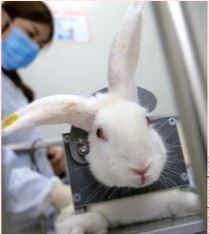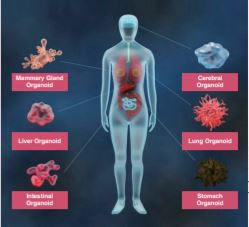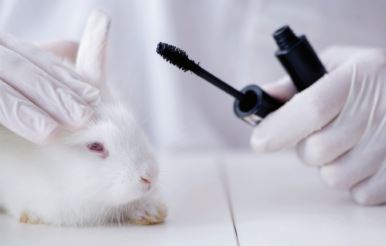The number of people adopting vegan lifestyles is rapidly increasing. Accordingly, the cosmetic industry picked up on the trend, producing vegan cosmetics that refrain from using animal-based ingredients. Since the emergence of veganism in the beauty industry, discussions have ensued on whether animal testing must be continued in the Korean cosmetic industry. Therefore, the Sungkyun Times (SKT) will look into the current situation of animal testing in the Korean cosmetic industry, agreements and oppositions to this, and the overall future of the beauty industry.
Animal Testing in the Korean Cosmetics Industry
What Is Animal Testing?
Animal testing is being applied in various fields, such as the health care industry, the food industry, and the cosmetics industry. According to the Animal and Plant Quarantine Agency (APQA), the number of animals used for experimentation has increased from 1.96 million in 2013 to 3.08 million in 2017. Humans have artificially bred animals to meet a genetic uniformity with the intent of increasing the reliability of laboratory experiments and ensuring that each responds to a certain stimulus in the same way. Animal testing is widely being conducted in the cosmetics industry in order to check whether products are harmful or not before their release into the market. For example, the Draize Test uses white rabbits to check whether the chemical materials are irritants to sensitive skin. Also, there is another experiment which examines its toxicity to reproduction using female rabbits and rats. In Korea, various experimental animals such as rats, guinea pigs, hamsters, rabbits, dogs, and cats are used in the cosmetics industry.
Current Situation of Cosmetic Testing
The discussion about the Cosmetics Act started with the intention to reduce damage to the experimental animals and develop the cosmetics industry. In February 2017, Korea enforced the Cosmetics Act Revision, prohibiting the production and distribution of cosmetic products that had undergone animal testing. This particular law, however, has many loopholes. Companies that violate this law are fined one million won, which is considered a low level of penalty. Accordingly, this law does not function well. Furthermore, there are some exceptions: animal testing is allowed legally in the case that an appropriate alternative method does not exist, or the legislation of countries receiving exports requires animal testing. Specifically, China imports only animal-tested cosmetics, and when a company exports products to the Chinese market, animal testing is allowed. Thus, many Korean companies still test on animals, exploiting this loophole. The Korea Animal Rights Advocates (KARA) found in September 2017 that there are only 46 “good companies” among all companies working in Korea. KARA announces regularly the list of good companies which do not rely on animal testing.

Agreement and Opposition to Cosmetic Animal Testing
Agreement to Cosmetic Animal Testing
1. Economic Reasons
In Korea, the cosmetics industry is one of the promising industries with a rapidly increasing number of exports. According to the Ministry of Trade and Industry (MTI), in 2017 the top three countries where Korea exports the largest number of cosmetic products to are China, America, and the Association of Southeast Asian Nations. In particular, the Korean cosmetic industry has a high level of dependence on exports to China. The data announced by the Korea Customs Service in June 2018 showed that the percentage of cosmetics that Korea exports to China is 65% of the total number of shipments. Also, the amount of exports is 2,900 billion won and accounts for over half of the total amount of exports. In June 2014, China announced that they would not import makeup products that had not been tested on animals, for the purpose of safety. If Korean cosmetic companies stop animal testing and do not export to China, the number of national exports will drastically decrease. This means a decrease in the number of exports in the cosmetics industry. Many experts expect that it would have a negative effect on the Korean economy.
2. Imperfect Alternative Methods

In the cosmetics industry, although alternatives such as artificial skin and organoids are developed to decrease animal testing, there are clear limitations. Thanks to artificial skin made from flakes of human skin, the researchers can judge the toxicity of the chemical materials without animal testing. Organoids, another alternative, are small experimental organs which are derived from stem cells. These can substitute the process of transplanting human cells to the experimental animals. Despite these alternatives, animal testing has not been totally replaced. This is because it is improper to apply the alternative experiments onto the complex physical characteristics of humans. Through the experiments, researchers should understand how the chemicals influence organisms to ensure the safety of the products. In addition, since alternatives are conducted to non-living cells, the researchers cannot find out how cosmetics affect humans’ reproductive systems and their respective genetic functions.
Opposition to Cosmetic Animal Testing
1. Unessential Cosmetic Animal Testing
The cosmetic industry is not as much of a priority in people’s lives as it is not directly related to important causes such as treating people’s diseases. On a similar wavelength, Huntingdon Life Sciences, a research organization founded in England, has revealed that only 5 - 25% of all animal experiments lead to identical results when applied to humans, and this also proves that there is no need to test new ingredients on animals. The Organization for Economic Co-operation and Development (OECD) holds a guideline for permitting new cosmetic substances that ensures the safety and well-being of both animals and human beings. They claimed that there already exists more than 20,000 base ingredients that have been deemed safe to come in contact with human skin. In fact, more than half are permitted in South Korea. Therefore, cosmetic brands can work with and create a bounty of safe blends for new products, eliminating the need to continue testing on animals and discover further materials to work with.
2. Animal Rights
Akin to human beings, animals exhibit life, and just as Nikola Tesla, a well-known inventor and engineer, once stated, hold a significant place in society. This shows that they possess the right to pursue a lifetime of safety and freedom. Despite this, the cosmetic industry exploits the incapability of animals to coherently express themselves and takes their basic privilege. There is proof, however, that it is possible to produce cosmetic goods of high quality while respecting the rights of animals. The European Union (EU) is living proof of this, as in 2013, they finally succeeded in banning the production and sale of any beauty product that had undergone animal testing. Through research that was funded by the European Commission, the EU acknowledged the existence of alternative testing methods. The EU used this evidence to back up their decision as they finalized the legislation with the full intent of supporting and promoting animal welfare worldwide. Many cosmetic brands such as Lush, Urban Decay, and The Body Shop also partook in many different animal cruelty campaigns, whilst also being praised for the quality of their products, without animal testing.

The Future of Cosmetic Testing
Further Development of Alternative Testing Methods
Though scientists have figured out how to develop artificial skin and eyes, they have not yet been applied in the cosmetic industry due to the costly and tedious process, as well as the current inability to meet the demand for these artificial organs. For years, scientists have constantly been researching for more effective ways to create artificial skin, and there has been a tremendous development of skin substitutes over the last couple of years. A team from Pakistan’s University of Health Sciences reports that they have created a cost-efficient way to produce artificial skin complete with blood vessels, which will hopefully mirror how real skin would react to real cosmetic products. There is unfortunately still no progress in the research of using artificial skin to gauge cosmetics’ effects on reproductive organs. Therefore, the cosmetic industry should continue to invest in further research.
Rectification of Existing Laws
In 2016, South Korea enforced the Cosmetics Act Revision with the intention of combatting animal testing done in the cosmetic industry. This law was not adequate enough to cause any influential changes, however, as the legislation is abstract. While the Cosmetics Act does state the importance of protecting animals and encourages alternative methods, it does not mention the importance of caring for these experimental animals. To support these test animals, the presence of a veterinarian would be beneficial. Out of 367 laboratories in South Korea, only a third of these institutions have a hired veterinarian to take care of the facilities’ animals. The legislation about taking responsibility for the animals would improve the quality of their lives.
With factors such as financial loss and unreliability taken into account, the absolute ban of cosmetic testing on animals is an idea that may seem far-fetched for the immediate future. This does not imply that using animals as test subjects should be normalized, however, as it is important to keep in mind the ethical repercussions that come with harming other living creatures. As technology is only getting better, with the long-term support of consistent financial investments, there is hope for a future where alternative methods can be used to test the safety of cosmetic products.
